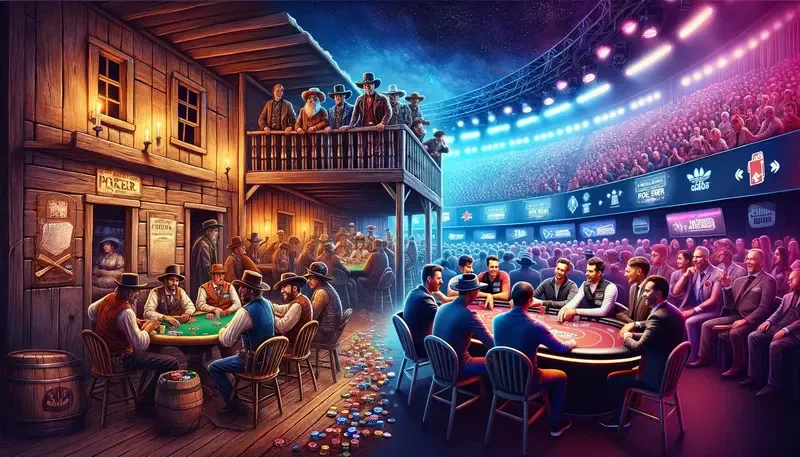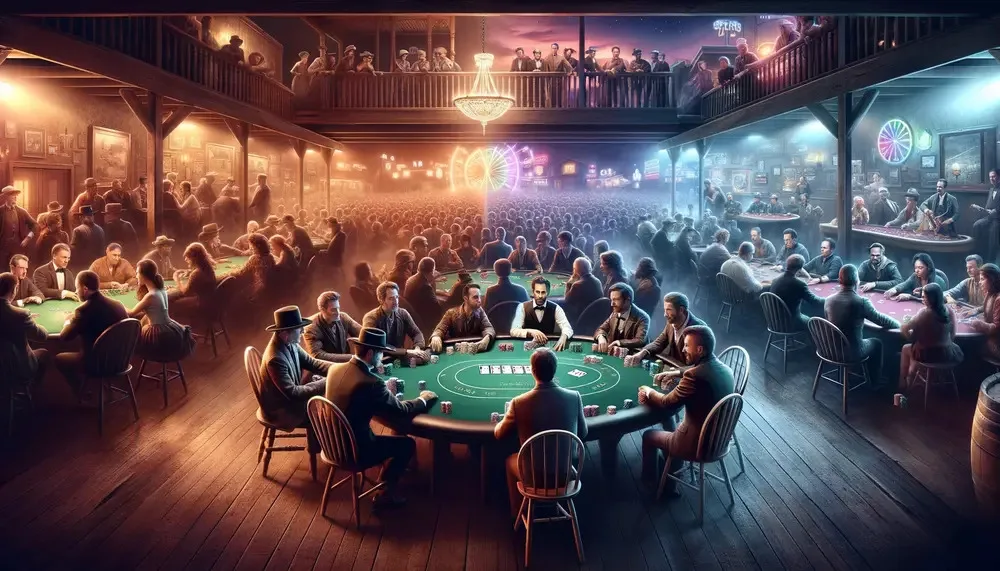
The Evolution of Sports Poker: From Saloons to Global Tournaments
In the vast panorama of competitive sports and games, few have traversed as intriguing a journey as poker. What began as a leisurely pastime in the dusty corners of saloons has morphed into a sophisticated contest of wits and strategy on the global stage. This evolution of sports poker, from its humble origins to the glamorous international tournaments we witness today, is a testament to the game’s enduring appeal and its capacity to adapt to changing times.
The Origins of Poker
Poker’s lineage is as complex and debated as the game itself. Emerging from a confluence of card games brought to America by European settlers, poker found its first foothold in the Mississippi River culture of the 18th century. These early forms of poker, played with a limited deck and simple betting rounds, were a staple of riverboat gambling, laying the groundwork for the game’s proliferation.
Poker’s Golden Age: The 20th Century
The 20th century heralded what many consider the golden age of poker. It was a time when the game’s modern variant, with its 52-card deck and the flush, was standardized. Poker became a mainstay of American culture, finding its way into the hearts of soldiers during both World Wars and cementing its place in the fabric of society. This era also saw the rise of legendary figures whose names are still revered in poker lore today.
The World Series of Poker (WSOP) and the Birth of Competitive Poker
The inception of the World Series of Poker in 1970 marked a pivotal moment in poker’s history, transforming it from a recreational activity into a sport of competitive prowess. The WSOP not only introduced the concept of a poker tournament to a wider audience but also established a global platform for the game’s elite to showcase their skills, turning poker players into celebrated professionals.
The Poker Boom: Television and the Internet
The advent of televised poker in the early 2000s, coupled with the explosive growth of the internet, catapulted poker into a new era of popularity. Shows like the World Poker Tour brought the game into living rooms around the world, while online platforms, such as the innovative prank-casino.com online casino, offered unprecedented access to the game, allowing players to hone their skills and compete with others from across the globe.

Modern Poker: A Global Phenomenon
Today, poker is a global phenomenon, with major tournaments taking place on nearly every continent. The game has diversified, spawning a myriad of variants and formats that cater to an ever-growing audience. Poker’s appeal lies not just in the thrill of competition but in the camaraderie and community it fosters among players of all backgrounds.
The Science and Strategy of Contemporary Poker
Modern poker is as much about the mind as it is about the cards. Advances in game theory and analytics have elevated the strategic depth of poker, enabling players to approach the game with a level of sophistication previously unseen. This era of poker champions those who not only master the mechanics but also understand the psychological and mathematical underpinnings of the game.
The Future of Poker
As we look to the future, poker is poised to continue its evolution. Technologies like virtual reality and blockchain offer new possibilities for game integrity and immersive experiences, while the global poker community grows ever more vibrant and diverse. The essence of poker, with its blend of skill, strategy, and chance, ensures that it will remain a beloved pastime and competitive endeavor for generations to come.
Poker’s journey from the saloons of yesteryear to the lavish global tournaments of today is a compelling saga of innovation, adaptation, and enduring appeal. As the game continues to evolve, one thing remains certain: the heart of poker beats stronger than ever, promising a future as exciting as its past.
Popular articles
-
 Jack Draper’s Renewed Conviction: A G...
Jack Draper’s Renewed Conviction: A G...In the unpredictable world of tennis, where the spirit is …
-
 Adaptive Bankroll Management Consider...
Adaptive Bankroll Management Consider...Managing bankroll effectively is one of the most critical aspects …
-
 The Evolution of Sports Poker: From S...
The Evolution of Sports Poker: From S...In the vast panorama of competitive sports and games, few …
